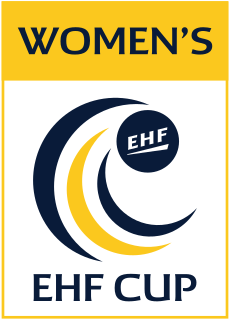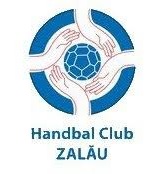
The European Handball Federation (EHF) is the umbrella organisation for European handball. Founded on 17 November 1991, it is made of 50 member federations and two associated federations, and is headquartered in Vienna, Austria. The current EHF President is Michael Wiederer, who was elected on 17 November 2016 and will serve until 2020. The federation celebrated its 20th anniversary on 17 November 2011 at a gala event under the slogan 'HeartBeat Handball'.

The Romanian women's national team represents Romania in senior women's international handball and is controlled by the Romanian Handball Federation, the governing body for handball in Romania. It competes in the three major international tournaments; the Olympic Games, the IHF World Championship and the EHF European Championship.

The Women's EHF Cup is an annual competition for women's handball clubs of Europe. It is organized by the EHF. It is currently the second-tier competition of European club handball, ranking only below the EHF Champions League.

The Women's EHF Champions League is the competition for the top women's handball clubs in Europe, organised annually by the European Handball Federation (EHF). The official name for the competition is the DELO WOMEN'S EHF Champions League. It is the most prestigious tournament for clubs, with the champions of Europe's top national leagues participating.

The Romania men's national handball team is governed by the Romanian Handball Federation and takes part in international team handball competitions. Romania was for many decades the most successful nation in handball with 4 gold medal wins at the World Championships, they served as a model for the sport. However, Romania failed to win a medal since 1990.

The 2009 World Women's Handball Championship took place from 5 to 20 December 2009 in China. It was the 19th edition of the World Women's Handball Championship and the second that took place outside of Europe. Russia won their fourth title.
Sports in Romania are an important part of the country's culture. Romania has risen to prominence in a number of sporting areas in recent decades. Association football is the most popular sport in Romania, a nation of 20 million. The most successful club is Steaua Bucharest, who were the first Eastern European side to win the European Cup and the European Supercup in 1986. Other important Romanian football clubs are Dinamo, Universitatea Craiova, FC Rapid and CFR Cluj, each of whom had mixed European success. Romania is one of only four national teams from Europe that took part in the first World Cup in 1930. The Romania national football team has taken part in seven FIFA World Cups and had its most successful run during the 1990s, when they reached the quarterfinals of the 1994 FIFA World Cup, losing a semifinal place against Sweden on the penalty kicks, Romania was ranked third by FIFA in 1997.
The Montenegrin First League of Women's Handball is the top women's team handball league in Montenegro. It is organised by the Handball Federation of Montenegro.

The Spain women's national handball team is the national team of Spain. It is governed by the Royal Spanish Handball Federation and takes part in international handball competitions.

The Liga Națională is a league of professional women's handball league teams in Romania. Run by the Romanian Handball Federation, the competition is also known as the Liga Florilor and is contested by fourteen teams.

Cristina Georgiana Neagu is a Romanian professional handballer who plays as a left back for CSM București and the Romanian national team.

HC Zalău is a women's handball club from Zalău, Romania, that plays in the Romanian Women's Handball League.

Alexandrina Cabral Barbosa is a Portuguese-born Spanish handballer for Nantes Handball and the Spanish national team.
The 2011–12 EHF Women's Cup Winners' Cup is the thirty-sixth edition of the EHF Women's Cup Winners' Cup, the continental event for domestic cup winners in Europe. FTC-Rail Cargo Hungaria entered the competition as title holders, following triumphed over CB Mar Alicante with an aggregate score of 57–52 in the previous year's finals. The Hungarian team went to the final in this season as well, where they successfully defended their title against Viborg HK with a 31–30 win both on the home and away leg, producing a 62–60 aggregate score.
The 1961–62 Women's Handball European Champions Cup was the second edition of the premier international competition for women's handball clubs. Like the inaugural edition, eight teams took part in the championship, which took place from November 1961 to 1 April 1962. Out of the eight founding members the Soviet Union didn't take part in the competition, while Romania was represented by national champion Rapid Bucharest and defending champion Ştiinţa Bucharest. Both teams were confronted in the quarter-finals, in the first match between two teams from the same country.
The 1962–63 Women's Handball European Champions Cup was the third edition of the premier international competition for European women's handball clubs, taking place from November 1962 to April 1963. Fourteen teams took part in the competition, with Denmark, East Germany, Hungary, Netherlands and Sweden making its first appearance, so a first round was introduced. 1962 champion and runner-up Czechoslovakia and Yugoslavia were granted byes for the quarter-finals. For the first time the final was carried out as a single match, taking place in Prague on April 14.
The 1963–64 Women's Handball European Champions Cup was the fourth edition of the premier international competition for European women's handball clubs, taking place from November 1963 to April 1964. Thirteen teams took part in the competition, with 1963 finalists Soviet Union and Denmark and debutante Norway being granted byes to the quarterfinals. The final was carried out as a single match taking place in Bratislava on April 4.
The 1964–65 Women's Handball European Champions Cup was the fifth edition of the international competition for European women's handball national champion clubs, taking place from late 1964 to 16 April 1965. The number of contestants decreased from thirteen to ten due to the absences of Austria, Poland and Romania, so the qualifying stage was reduced from five ties to just two. Unlike the two previous editions, the final was carried out as a two-legged tie.
The 1996–97 EHF Women's Champions League was the fourth edition of the modern era of the 1961-founded competition for European national champions women's handball clubs, running from 10 October 1996 to 10 May 1997. The competition system was reformed, as the group stage was expanded from 8 to 16 teams, now replacing the Round of 16, and the quarter-finals and semifinals were reestablished.
The 2012–13 EHF Women's Champions League was the 20th edition of the EHF Women's Champions League, the competition for top women's clubs of Europe, organized and supervised by the European Handball Federation. Budućnost Podgorica was title holder, after beating Győri Audi ETO KC in past season's final.














